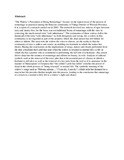| dc.contributor.author | Mwanzi, Hellen OA | |
| dc.date.accessioned | 2013-06-24T15:45:31Z | |
| dc.date.available | 2013-06-24T15:45:31Z | |
| dc.date.issued | 2004 | |
| dc.identifier.citation | ASWANI, PROFMWANZIHELLENORONGA. 2004. Widowing and Remarriage. East Africa in Transition. Nairobi. University of Nairobi Press | en |
| dc.identifier.uri | http://profiles.uonbi.ac.ke/hmwanzi/publications/widowing-and-remarriage-east-africa-transition-nairobi | |
| dc.identifier.uri | http://erepository.uonbi.ac.ke:8080/xmlui/handle/123456789/39268 | |
| dc.description.abstract | “The Widow’s Perception of Being Remarriage” focuses on the topical issue of the process of remarriage as practiced among the Banyore community of Vihiga District of Western Province. It is a report of a research carried out in 2003. The research involved ten widows of ages between sixty and ninety-five, for the focus was on traditional forms of remarriage with the view to correcting the much-touted term “wife inheritance”. The testimonies of these widows led to the dismissal of the term “wife inheritance” as both derogatory and wrong, for a widow in this community is not regarded as part of the property which the dead spouse has left behind for others to inherit. The term robs the widow the voice to choose, yet the reality is that the community reveres a widow and creates an enabling environment in which she makes her choice. Basing the conclusions on the implications of songs, dances and rituals performed from the time a husband died until that time when his widow is returned to normal life—a life in which she has a partner who is committed to performing the full role of a husband—this article delves deep into the essence of remarriage and affirms its beauty, its role. Analysis of cultural symbols such as the removal of the erect pike that is the essential part of a house in which a husband is still alive as well as the removal of a key pole from the roof as if to announce in the manner of Shakespeare’s Cleopatra that “the soldier’s pole has fallen” enriches the power of ritual in the whole process of “being returned” to normal life. The symbolic meaning of the widow’s songs such as “Ndoma, ndoma…”(“I am dry, I am dry”) which infer her demand for a man in her life provides further insight into the process, leading to the conclusion that remarriage or a return to a normal wifely life is a widow’s right and choice | |
| dc.language.iso | en | en |
| dc.title | Widowing and Remarriage | en |
| dc.type | Article | en |
| local.publisher | Department of Literature, Faculty of Arts, University of Nairobi | en |

